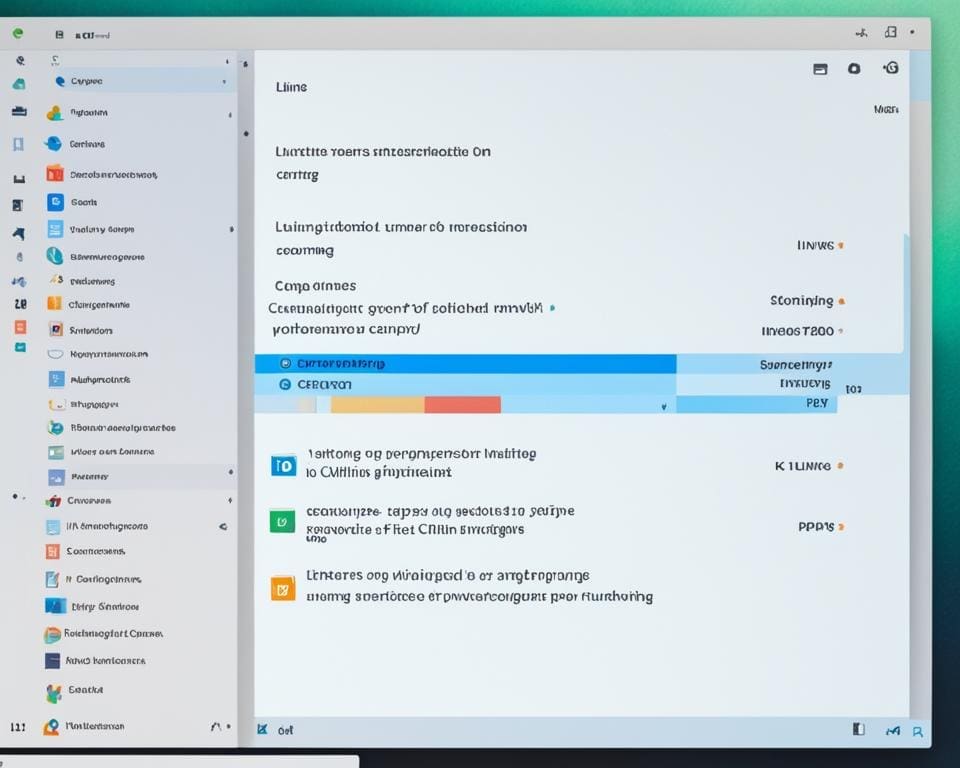Linux vs. Windows is a big choice in today’s digital world. Windows is huge, with a 73% market share and powers over 1.4 billion PCs. But Linux, known for its customisation and open-source nature, offers great value and adaptability.
Even though Linux has just under 4% of the market, it has a strong community. Over 13,500 developers have worked on its kernel since 2005. When comparing, think about what matters more to you: simplicity or privacy?
This article helps you pick the right OS. We will look into both, highlighting their strengths and weaknesses. This ensures your choice matches your needs and preferences perfectly.
Understanding the Basics of Linux and Windows
Learning about Linux and Windows is key for tech users today. These operating systems have unique benefits due to their development history and structure.
Definition and History of Linux
In 1991, Linus Torvalds introduced Linux as a Unix alternative. At its core sits the Linux kernel, fostering adaptability and high performance. Over time, Linux’s evolution has been driven by its community, enhancing its security and versatility.
Linux’s open-source nature encourages joint efforts in improvement. Users have many distributions like Ubuntu to choose from, each offering different desktop environments such as GNOME and KDE.
Overview of Windows
Since 1985, Microsoft’s Windows has led in graphical user interfaces. It has evolved to Windows 10 and Windows 11, favored for its ease of use. Windows serves various users, from newbies to experts.
While Microsoft has improved security, Windows’ popularity also attracts malware. Despite these issues, Windows maintains a strong position in the market, even with its resource use and security challenges.

Linux vs. Windows: Which OS is Right for You?
Comparing Linux and Windows shows both have unique pros. Knowing these can reveal the best fit for user needs.
Key Features of Linux
Linux caters to a broad audience with its strong features. It shines with:
- Security: With fewer users, Linux faces less malware threats.
- Open-source benefits: This allows users to tweak and customize freely, attracting tech enthusiasts.
- Stability: Linux stays reliable even when heavily loaded, preferred for servers and intense computing tasks.
- Cost-effectiveness: Many Linux versions are free, offering affordable choices for everyone.
Key Features of Windows
Windows is known for being user-friendly with broad software support. Its key advantages are:
- User-friendly interface: Its simple design makes navigation effortless for all.
- Gaming on Windows: It supports a vast selection of games and multimedia through DirectX.
- Software availability: You’ll find applications for various needs and tastes.
- Driver support: Windows aids in managing different hardware setups easily.
Cost Considerations
The cost of these operating systems differs significantly. Linux is mostly free, making it lighter on the wallet. Meanwhile, Windows users face licensing fees which change with the version.
This price difference is crucial for schools and those in developing areas. That makes Linux an attractive option for cost-conscious users who don’t want to compromise on quality.
Comparative Analysis of Linux and Windows
Exploring the worlds of Linux and Windows reveals how they cater to different users. Windows, launched in 1985, now runs on over 1.4 billion PCs. This makes it incredibly popular, thanks to its easy-to-use interface and broad support. On the flip side, Linux offers many free versions, like Ubuntu and CentOS. This attracts advanced users who want more control over their computers.
Comparing their efficiency and security shows Linux often outperforms Windows. Linux’s monolithic kernel and case-sensitive files mean it’s great at managing tasks. Its command-line interface lets users do complex jobs easily. However, Windows, with its microkernel and case-insensitive files, simplifies some tasks but can complicate others.
The choice between Linux and Windows can depend on the user’s skill level. Newcomers might prefer Windows for its ease of use and wide software support. Yet, experts might pick Linux for its strong security and reliability. These factors continue to influence the future and popularity of both operating systems.








